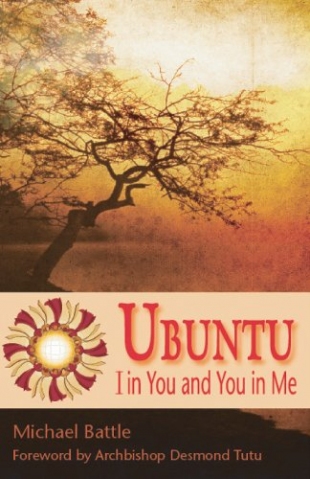Michael Battle, former dean of Virginia Theological Seminary, now serves as theologian of the Cathedral Center of St. Paul in Los Angeles and as rector of Our Saviour Parish in San Gabriel, California. Ordained by Archbishop Desmond Tutu, he lived and worked for two years as a parish priest in South Africa. A well-known writer, speaker, and retreat leader, his ministry covers the globe and focuses on Christian non-violence, spirituality, and African Church studies.
Battle defines Ubuntu as "an African concept of personhood in which the identity of the self is understood to be formed interdependently through community." This goes against the conventional worldview of Westerners who understand the self as standing apart and in competition with others. Archbishop Desmond Tutu, who wrote the foreword to this paperback offers further clarification:
"A person with Ubuntu is open and available to others, affirming of others, does not feel threatened that others are able and good, for he or she has a proper self-assurance that comes from knowing that he or she belongs in a greater whole and is diminished when others are humiliated or diminished, when others are tortured or oppressed."
The author goes on to point out while Ubuntu expands our horizons and deepens our spirituality, cultivating this kind of communal self takes practice. He probes the Christian roots of the theology of Ubuntu which Tutu has described: "We and all creation are creatures of love. We are made by love, we are marked by love, and we are made for love." Battle stresses that we are meant to be in fellowship and that means seeing others as part of the human family. Jesus demonstrated this aspect of Ubuntu in his relationships.
Battle sees this Christian Ubuntu as a great gift to the church in the West where there is a need to learn the value of communal experience as formative of the person. And it can enrich spirituality by showing us:
• "that all life contains the possibility of meeting God"
• "how God seeks mutuality with us — a revolutionary concept that we could actually become God's friend"
• "that any form of spirituality must always be reflective of relationality"
• " that the one who prays is a symphonic voice, a voice that cannot be heard without the relation of other voices"
It is easy to give lip service to these attributes of Ubuntu but in a world traumatized by hatred, violence and war, it is necessary to constantly practice this concept of personhood, cooperative living, and communal solidarity.
